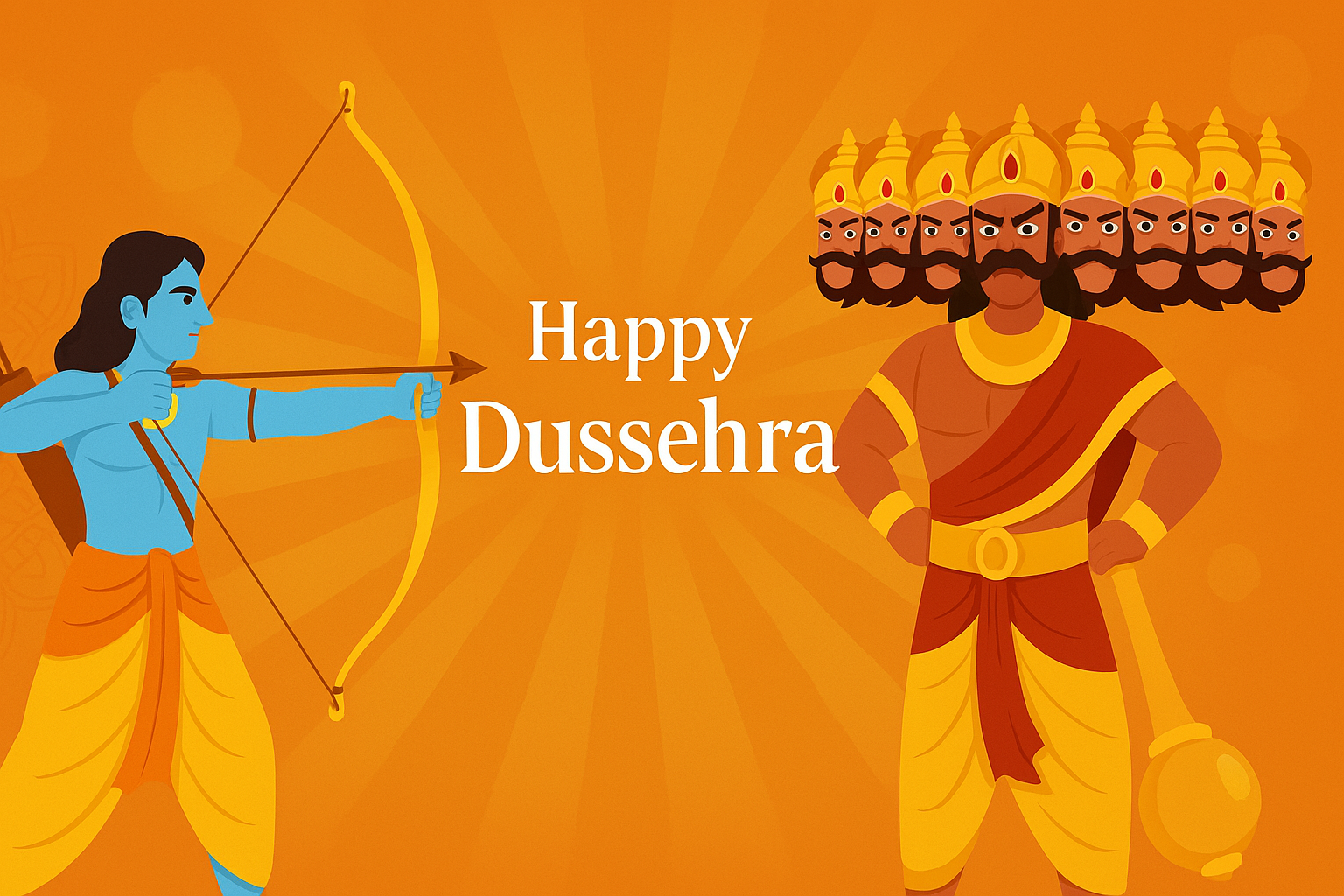Subscribe to Trending News Wala
India, known as the land of festivals, celebrates numerous cultural and religious events that reflect its deep-rooted traditions. Among these, Dussehra, also called Vijayadashami, holds a special plac

India, known as the land of festivals, celebrates numerous cultural and religious events that reflect its deep-rooted traditions. Among these, Dussehra, also called Vijayadashami, holds a special place in the hearts of millions of Hindus. In 2025, Dussehra will be celebrated on Thursday, October 2nd, and like every year, it will mark the end of the nine-day Navratri festival, ushering in a time of joy, devotion, and victory of good over evil.
This article provides a complete guide to Dussehra 2025, covering its history, spiritual meaning, regional variations, how it's celebrated, and why it continues to hold such significance in modern times.
Dussehra is one of the most important Hindu Ancient festivals, observed on the tenth day (Dashami) of the Ashwin month of the Hindu lunar calendar, which usually falls in September or October. It is celebrated with great enthusiasm across India and by Hindus worldwide.
The festival symbolizes the victory of good over evil. It is associated with two major mythological stories:
Lord Rama’s victory over the demon king Ravana in the epic Ramayana.
Goddess Durga’s triumph over Mahishasura, a powerful demon, in the Devi Mahatmya.
In the Ramayana, Lord Rama, the seventh incarnation of Lord Vishnu, goes to Lanka to rescue his wife Sita, who was abducted by the demon king Ravana. With the help of his brother Lakshmana, devotee Hanuman, and the Vanara (monkey) army, Rama defeats Ravana in a fierce battle. This victory is celebrated as Dussehra.
Burning effigies of Ravana, Meghnath (his son), and Kumbhkaran (his brother) symbolizes the destruction of evil and the reaffirmation of righteousness.
Another version of Dussehra is rooted in the story of Goddess Durga, who battled the shape-shifting demon Mahishasura for nine days and nights. On the tenth day, she defeated him, restoring peace and dharma. In eastern parts of India, especially West Bengal, this victory is celebrated as Vijayadashami, marking the end of Durga Puja.
Dussehra is more than just a mythological celebration. It carries deep cultural, ethical, and spiritual values that are relevant even today.
Moral Teaching: It teaches us that truth, dharma (righteousness), and good deeds will always triumph over lies, evil, and injustice.
Cultural Unity: Though celebrated differently across India, the core values of Dussehra bring unity among diverse communities.
New Beginnings: It is also considered an auspicious time to start new ventures, buy property or vehicles, or begin educational and professional journeys.
India's diversity makes Dussehra celebrations unique in each region. Here’s how different parts of India celebrate the festival:
The most iconic tradition is the Ramlila – a dramatic reenactment of the life of Lord Rama.
Large grounds are set up with stages and huge effigies of Ravana, Meghnath, and Kumbhkaran.
On the final day, the effigies are set ablaze, followed by fireworks, symbolizing the end of evil.
Here, Dussehra marks the end of Durga Puja.
Beautifully crafted idols of Goddess Durga are immersed in rivers and lakes in a ritual known as Visarjan.
The event is accompanied by singing, dancing, and emotional farewells to the Goddess.
The festival is called Dasara in Karnataka, especially famous in Mysore.
The Mysore Dasara is a grand royal celebration with decorated elephants, traditional dances, music, and a grand procession.
In Tamil Nadu, families display Golu dolls, and women are invited to homes for Haldi-Kumkum ceremonies.
Dussehra is celebrated with Ayudha Puja, where tools, books, vehicles, and instruments are cleaned and worshipped.
People exchange Apta leaves symbolizing gold and wish each other prosperity and happiness.
Dussehra follows the vibrant Navratri celebrations filled with Garba and Dandiya dances.
The tenth day is marked with special pujas, feasting, and sometimes Ravan Dahan.
As Dussehra 2025 falls on October 2nd, which is also Gandhi Jayanti, it's a dual celebration of truth and righteousness. Here are a few ideas to celebrate meaningfully:
Attend a Local Ramlila: Support cultural traditions by attending or volunteering in a local Ramlila event.
Eco-Friendly Celebrations: Choose eco-friendly effigies and idols to reduce environmental harm.
Teach Children: Share the stories of Ramayana and Durga Puja with younger generations to keep traditions alive.
Charity and Kindness: Like Lord Rama and Goddess Durga, stand up for justice by helping the less fortunate or supporting good causes.
Start Something New: Use this day as a launchpad for your personal or professional goals.
The word “Dussehra” comes from the Sanskrit word Dasha-Hara, meaning the defeat of the ten-headed (Ravana).
Mysore Dasara has been celebrated for over 400 years!
Ravana is worshipped in some parts of India like Mandore (Rajasthan) and Mandsaur (Madhya Pradesh) as a learned scholar and devout Shiva bhakt.
Even in today’s fast-paced, digital world, Dussehra’s core message remains timeless:
It reminds us to battle our inner evils – anger, ego, hatred, greed, and jealousy.
It emphasizes truth, honor, and values – qualities much needed in both personal and professional life.
It inspires us to celebrate courage, devotion, and community bonding.
As the world becomes increasingly divided, festivals like Dussehra provide a reminder of universal values that bring people together.
Dussehra 2025 is more than just a ancient festival of india – it's a celebration of hope, victory, and spiritual strength. Whether you're witnessing the Ravan Dahan in Delhi, participating in aarti in Kolkata, or enjoying the royal procession in Mysore, Dussehra connects all Hindus with a shared belief: no matter how strong evil may seem, good will always prevail.
This year, as we prepare to celebrate Dussehra on October 2nd, let’s not only honor our traditions but also apply their teachings in our lives. Let us rise above negativity, strive for goodness, and light the fire of righteousness in our hearts.
Writer and content creator
Log in to share your thoughts and engage with other readers.